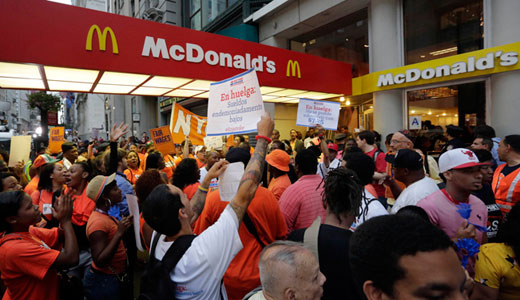
Give McDonald’s honcho Jeff Stratton the “Petulant Plutocrat Of The Week” award. He couldn’t stop grinning last December when he became the top exec for the U.S. side of the McDonald’s fast food empire. But Stratton wasn’t smiling earlier in October when McDonald’s worker Nancy Salgado stood up from a hotel ballroom audience during one of his talks to protest Mickey D’s notorious poverty wages.
Called out Salgado, “It’s really hard for me to feed my two kids and struggle day to day. Do you think this is fair that I have to be making $8.25 when I have worked for McDonald’s for 10 years?” Stratton’s retort: “I’ve been there 40 years.” Security staff had Salgado arrested, and she must appear in court in Chicago on November 1. Meanwhile, the video of the encounter went viral online and figures to bolster the ongoing campaign nationwide for a $15 fast food minimum wage.
That’s one of many examples of how the gap between the rich and the rest of us isn’t just a modern phenomenon; these days it’s grown into a chasm. Nowhere is that more evident than in a comparison between – we kid you not – old Rome and modern Mexico.
Marcus Crassus, the wealthiest single individual in ancient Rome, had an annual income that equaled the take-home of 32,000 average Romans. Carlos Slim, the world’s richest single individual today, has an annual return on his fortune that equals the average annual wage of 400,000 of his fellow Mexican nationals.
Slim isn’t alone. A new report shows just 110 Russian oligarchs control half of that country’s wealth. These are the cronies who made out like bandits when they grabbed, at rock-bottom prices, state-run industries after the USSR collapsed 22 years ago. Here are other nuggets from the world of the rich, in contrast to the rest of us:
- If you added up all the wealth in the world, as of this past June, and gave an equal share to every adult on the planet, what would your share be? Researchers at the Swiss banking giant Credit Suisse have an answer for you. Average global wealth per adult now equals over $51,000, they report, up 4.9 percent over 2012. In the real world, of course, the vast majority of the world’s people hold next to no wealth at all. Over two-thirds of the world’s adults, 68.7 percent, have less than $10,000 to their names.
Together these 3.2 billion people own just three percent of the world’s wealth. Those global adults sitting on over $1 million each in personal net worth, on the other hand, make up just 0.7 percent of the world’s adult population. They hold 41 percent of the world’s wealth. Sounds like Russia; also the U.S.
- Early on in the federal government shutdown – a move he helped engineer – right-wing Rep. Michael McCaul, R-Texas, announced he would give up to charity his entire House paycheck for the duration of the unpleasantness.
McCaul might have some trouble noticing that any of his income has gone missing. He and his colleague, Rep. Darrell Issa, R-Calif., each have more than twice as much personal wealth as any other lawmaker. The Center for Responsive Politics puts McCaul’s fortune at $501 million, Issa’s at $480 million. Members of Congress get $5,400 every two weeks in salary. If McCaul nets a three percent return on his investments this year, he’ll take in over $7,200 every working hour.
- Corporate execs are scrambling for new reasons to stall the three-year-old Dodd-Frank Act mandate that requires companies annually disclose the ratio between their CEO and median worker pay. The median is the point where half the workers earn more and the other half earn less. Corporate flacks had first argued that having to tally up all their worker pay stubs and compute a median would impose much too heavy a burden upon them.
But the U.S. Securities and Exchange Commission last month proposed regulations to let corporations use statistical sampling to compute their medians. Now a new poll of 375 corporate power suits shows execs are kvetching that, determining the best sampling approach “will be no easy task.” The SEC will accept public comment on the new proposed ratio disclosure rules through December 2.
- What every billionaire now seems to not-so-secretly desire: A little place in Italy’s Tuscany. Over the past eight months alone, four Tuscan vineyards have sold for between $34 million and $48 million. The deep-pocket set, explains the Financial Times, has come to appreciate “the Italian lifestyle, not to mention the government’s more lenient approach to individual wealth.”
Sam Pizzigati, a veteran labor journalist, edits Too Much, an online journal of wealth and inequality sponsored by the Institute for Policy Studies.
Photo: Salgado’s protest over unlivable wages helped fuel the “Fight for 15” campaign (pictured), which demands a $15 fast food minimum wage. AP












Comments